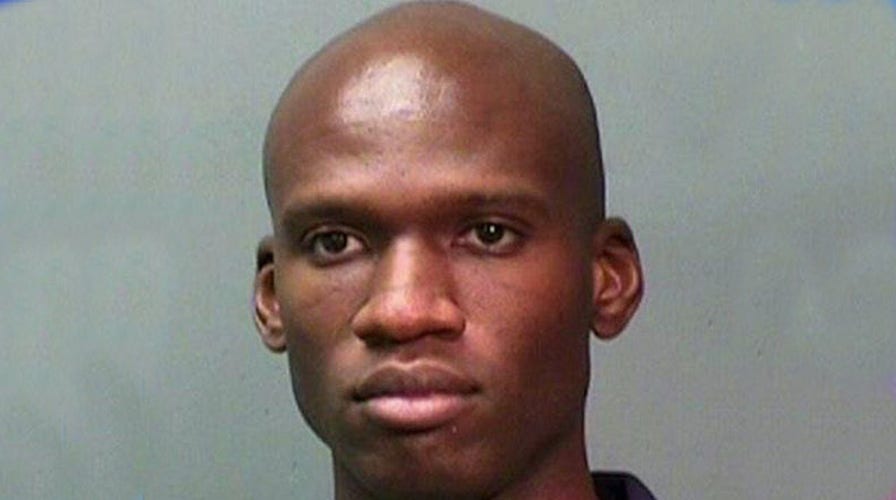Report: Navy Yard shooter treated for mental illness
Rick Leventhal reports from Washington, D.C.
WASHINGTON – The deadly attack carried out at the Washington Navy Yard by a former reservist with a history of violence and mental problems has once again put the national spotlight on the country’s mentally ill and their access to guns.
Efforts to address the problem received bipartisan support following last year’s shooting in Newtown, Conn., where 20 children were killed by a mentally ill gunman.
But despite the fanfare, very little progress on a national level has been made. Nine months after Newtown, no new federal gun-related mental health laws have emerged.
In March, South Carolina Republican Sen. Lindsey Graham spearheaded a plan to change firearm background check laws so that those with court-documented mental illness would not be able to purchase guns. The NICS Reporting Improvement Act of 2013 would have also clarified gaps in current law pertaining to who would lose their right to buy and carry guns based on mental illness.
The proposal, supported by Sens. Jeff Flake, R-Ariz.; Mark Begich, D-Alaska; and Mark Pryor, D-Ark., would have changed the definition of mental illness in the federal database and alerted gun sellers to people who had been found by a court to be an imminent danger to themselves or others. The measure also called for individuals to be added to the database if they had been found guilty but mentally ill in a criminal case; found not guilty by reason of insanity; found incompetent to stand trial; or involuntarily committed to a psychiatric hospital.
The bill was defeated.
Many of Graham’s provisions were later tacked onto a GOP gun control alternative which was also defeated.
Graham has not commented on that legislation in the wake of the latest shooting. But Sen. Brian Schatz, D-Hawaii, said in a statement Tuesday that "now is the time to do the right thing" and address the issue.
"While legislation can't put an end to all violence, lawmakers must do what is right and close the gaping holes in our system in order to keep guns out of the hands of criminals and the severely mentally ill," he said.
Following the Newtown school shooting, President Obama declared that his administration would help “bring mental illness out of the shadows.” The administration hosted a conference in June to discuss the problem.
The daylong deep dive into the country’s mental health issues featured Health and Human Services Secretary Kathleen Sebelius, Education Secretary Arne Duncan, Veterans Affairs Secretary Eric Shinseki and actor Bradley Cooper, who played a man coping with mental illness in "Silver Linings Playbook." It wasn’t clear whether any initiatives came out of the event.
Some have used the latest shooting to call for changes in overall background checks, not specific to the mentally ill. An effort to expand background checks failed in Congress earlier this year, and an effort to renew an assault-weapons ban barely got off the ground.
"When will enough be enough? Congress must stop shirking its responsibility and resume a thoughtful debate on gun violence in this country. We must do more to stop this endless loss of life," Sen. Dianne Feinstein, D-Calif., said in a statement.
The effort to address the mentally ill, though, had bipartisan backing and even won praise from the National Rifle Association. The NRA did not return calls from FoxNews.com for comment for this article.
Unlike the federal government, state legislatures have been more successful in passing mental health laws.
According to the National Conference of State Legislatures, almost every state is looking into some aspect of beefing up their mental health care laws. About two-dozen have introduced legislation this year.
New York became the first to tighten its gun restrictions following Newtown. Lawmakers in Albany passed a series of measures that limited access to guns for people with mental illness. New York also passed a law requiring mental health professionals to contact a third party if they believe a patient is dangerous.
Legislators in Maryland passed a measure that expands the category of people prohibited from buying or possessing firearms for mental health reasons. The law also stipulates that those who have been involuntarily committed to a facility won’t be allowed access to a gun. The law goes into effect next month.
The state legislature in Connecticut increased funding for security and mental health treatment for its residents.
On Monday, Aaron Alexis, a 34-year-old defense contractor and former reservist used a valid pass to gain access to an area at the Navy Yard in D.C. where he started shooting, picking off people in the deadliest massacre on a military installation since the Fort Hood, Texas tragedy four years ago. He used, among other weapons, a shotgun he purchased in Lorton, Va.
While his motive remains a mystery, the picture of Alexis that’s emerging is a toxic mix of mental illness, isolationism and access to guns.
Many say it’s a pattern that’s all too familiar and criticize the government for not taking more action to get guns out of the hands of the mentally ill.
“The backbone of the government is contractors and we have to have a better system to vet people,” former Navy SEAL Jonathan Gilliam told Fox News, referring to his security clearance. “When there are telltale signs … why aren’t those things picked up on?”
He added that politics needs to be taken out of the national debate on guns, military and mental illness.
The Associated Press reported Alexis had suffered from a growing list of mental issues including paranoia and sleep disorders and had episodes where he heard voices in his head. Alexis had been treated by the Department of Veterans Affairs for his mental problems since August.
Alexis had been investigated in separate incidents by authorities in Texas and Washington for firing a handgun during disputes with a neighbor and construction worker. He’s also had a string of disciplinary infractions leading up to his discharge from the Navy in 2011.





